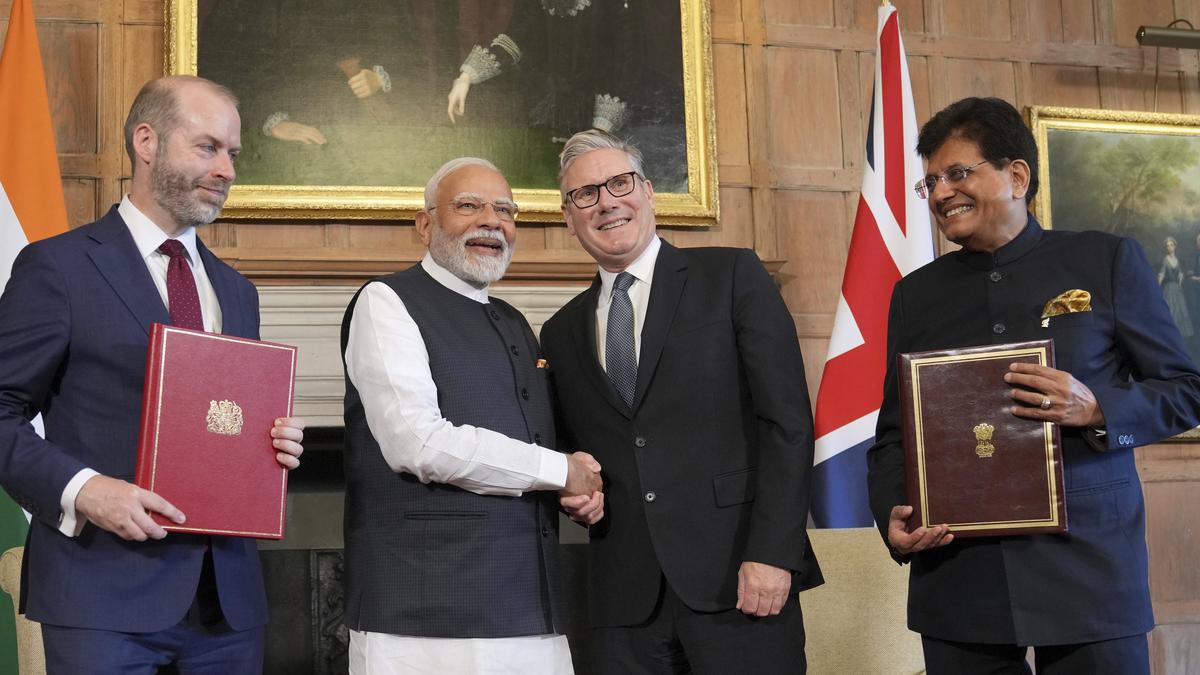The government expects the India-U.K. Comprehensive Economic and Trade Agreement (CETA) signed by the two countries on Thursday (July 24, 2025) to lead to substantial benefits for a variety of Indian export-oriented sectors such as agriculture, textiles, leather, chemicals, and engineering goods, according to officials aware of the calculations.
Under the deal, the U.K. will benefit from a 12 percentage point average tariff reduction — from the current average of 15% to a new average of 3% — for items it exports to India. It will see a removal or reduction of tariffs on 90% of the tariff lines, covering 92% of the items currently exported from the U.K .to India.
Among the items that will find cheaper access to the India market from the U.K. are whiskey, items related to aerospace, automobiles and electrical machinery.
The economic and trade deal was signed in the UK by Union Commerce and Industry Minister Piyush Goyal and the U.K’.s Secretary of State for Business and Trade Jonathan Reynolds, in the presence of the Prime Ministers of both the countries.
“In agriculture, India exports $36.63 billion globally, while the UK imports $37.52 billion, but imports just $811 million from India, revealing room for growth in high-value agri products,” a government official said. “Duty-free access is expected to increase agriculture exports by over 20% in the next three years.”
India has not provided the U.K access to its most sensitive sectors such as dairy products, apples, oats, and edible oils.
“These exclusions reflect India’s calibrated trade strategy—one that prioritises food security, domestic price stability, and vulnerable farming communities,” the official said.
Competitive Edge
Apart from this, the deal with the U.K. “sharpens” India’s competitive edge on a number of agricultural and food-related items, the official explained.
For example, in the export of fresh grapes to the U.K., the deal provides India an advantage over Brazil and brings it at par with top exporters such as Egypt and South Africa. In processed food preparations, the deal helps India gain ground on the U.S., China, and Thailand.
“Notably, in the processed food sector, tariffs on 99.7% of lines have been slashed from as high as 70% to zero, offering a major boost for Indian exporters,” the official said.
When it comes to baked items, India has become more competitive than the U.S., China, Thailand, and Vietnam. On fresh and chilled vegetables India now stands at an advantage over the U.S., Brazil, Thailand, and China. Similarly, the deal has granted India an advantage over the U.S., Japan, Thailand, China, and Malaysia in the export of sauces.
“Shrimp, tuna, fishmeal, and feed—currently taxed between 4.2-8.5%—will become completely duty-free, unlocking rapid export growth especially since there is huge potential as, despite strong demand in the UK market, India’s current share in UK marine imports is only 2.25%,” the official said.
In the textiles sector, the elimination of tariffs on textiles from the earlier average level of 12% will remove India’s existing duty disadvantage versus competitors such as Bangladesh and Cambodia.
“The CETA is anticipated to trigger a dramatic 30-40% increase in India’s chemical exports to the U.K., propelling figures to an estimated $650-750 million in one year since it comes into effect,” the official said. “Leather exports are expected to increase their market share in the U.K .by 5 percentage points.”
What the U.K. gets
Under the agreement, India has agreed to remove or reduce tariffs on 90% of its tariff lines, which cover 92% of the U.K.’s exports to India.
“India has agreed to remove tariffs on 64% of tariff lines at entry into force,” the U.K. government said. “After staging over 10 years, the agreement will mean 85% tariff lines will be eligible for tariff free entry into India.”
According to a statement from the U.K. government, India’s average tariffs on products from the UK will drop from 15% to 3% “which means British companies selling products to India from soft drinks and cosmetics to cars and medical devices will find it easier to sell to the Indian market”.
Among these tariff reductions is a reduction of import duties on whiskey from the U.K. — from 150% to 75% immediately and then gradually dropped over the next 10 years to 40%.
Items related to aerospace imported from the U.K. will face nil tariffs, down from the existing 11%, automobile imports will face a tariff reduction of 100 percentage points — from up to 110% to 10% under a quota — and electrical machinery coming into India from the U.K. will see a tariff reduction to either 0% or 11%, depending on the product, from the existing maximum of 22%.
Published – July 24, 2025 06:49 pm IST

